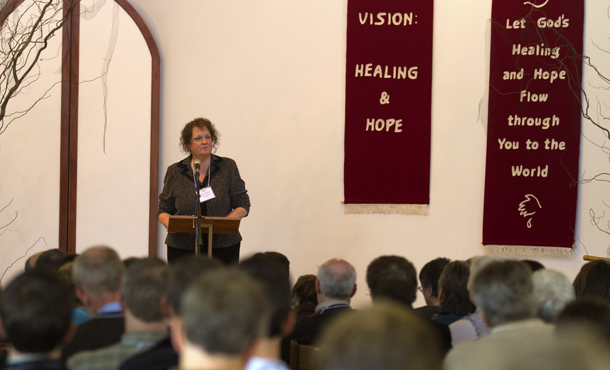After Bev Miller was institutionalized twice in the 1970s with bipolar disorder, not long after graduating from then-Eastern Mennonite College, a series of factors helped her to get back “in touch with reality,” as she calls it.
For one, her family owned a business that employed her when no one else likely would. But the proper medications, a supportive network and her church all played integral roles in her comeback, Miller said.
So for Miller, of Wauseon, Ohio, the return to her alma mater this week made perfect sense.
She’s one of nearly 300 attending Eastern Mennonite Seminary’s School for Leadership Training conference, which started Monday and wraps up today. She’s one who understands the importance of relationships to people living with mental illness.
The conference addresses how the church can be a healing space for mental illness.
For Miller, the patchwork story told during one Tuesday presentation hit close to home.
Lonnie Yoder, professor of pastoral care at EMS, read the story of one fictional but realistic “Charlie,” who started showing signs of bipolar disorder when he was in high school. Despite his and his family’s best efforts to stay “normal” during his lifelong battle against the illness, fellow churchgoers, family members and friends began to shy away from him.
Pam Reese Comer, director of counseling services at Eastern Mennonite University, said that’s exactly what they shouldn’t do.
“Yes, a mental disorder means something is out of order, but the person at [its] core is not out of order,” she said. “Focus on the whole person and know they are there and need your relationship to continue.”
Comer added that you don’t have to be a therapist or doctor to help someone with mental illness.
“Step alongside them, not in front or behind them,” she said. “By stepping into the mud, the mud changes, their experience changes.”
Comer warned against thinking that a mental illness is something to solve or that someone with a mental disorder will get back to his or her former self.
“Life will not get back to the way it used to be,” she said. “All involved must get used to a new normal.”
She reminded those in the audience that having a mental disorder doesn’t imply a character flaw or mean that the sufferer is being punished. Also, mental illness affects many more people in a community than just those who have it, and every person should be tending to his or her own mental health, she added.
Holding a mental health-centered conference is a step in the right direction, according to Miller.
“It’s a group of people that I know want to be here and want to help,” she said.
Courtesy Daily News Record, Jan. 24, 2013

I thought I was sitting down by one of the pastors only to find out she/Candace was from the Harrisonburg newspaper. Ted Swartz told me “you are so Mennonite” when I told him that I was concerned that those in planning would think I sought out the internview. Bev Miller